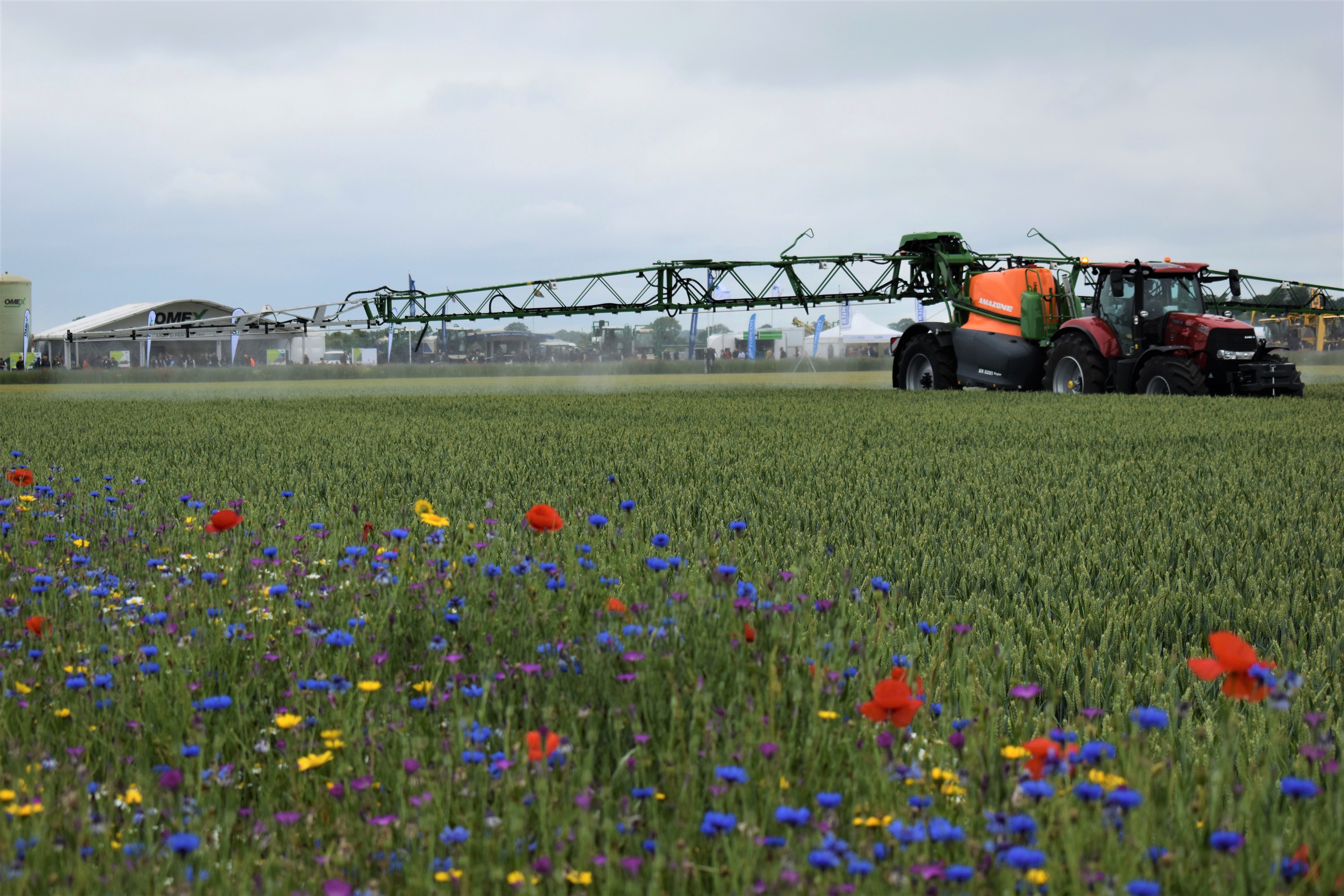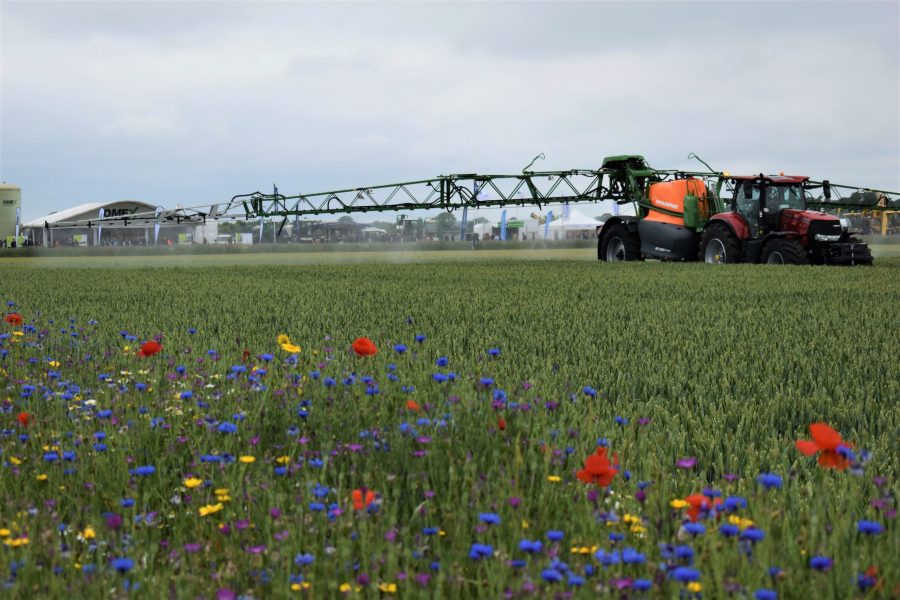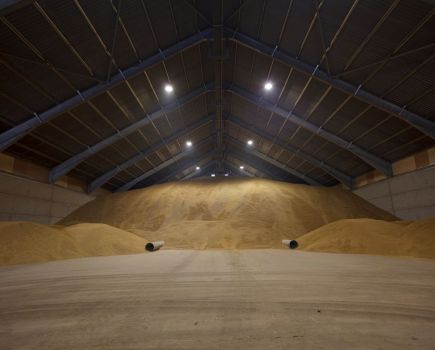
After an online-event in 2020, Cereals returned to its in-person form once again this year. CPM paid a visit to the Lincolnshire site.
Now is the right time for good teamwork and knowledge exchange.
By Charlotte Cunningham
Crop plots, a jam-packed seminar programme and more tyres to kick than one could dream of could all be used to describe this year’s Cereals Event, which took place at its Lincolnshire home in Boothby Graffoe at the end of last month.
But it was ‘what’s next for farming?’ that was the question on everyone’s lips – with many seminar sessions focusing on what may lie ahead for the industry and how growers can best prepare for change.
And providing some clarity on what the industry can expect in terms of government direction, was Secretary of State, George Eustice.
Speaking at the event, the minister announced a first look at how the new Sustainable Farming Incentive – one of three new schemes which will reward environmental land management – is going to shape up.
“In recent years, we’ve seen a renewed interest in an ancient knowledge – the knowledge around what makes healthy, fertile soil. Farmers instinctively understand this – we know that soil is more than a growing medium to hold, we know that soils are alive, and farmers know that the extent to which they have humus and organic matters in the soil is key to plant health.
“That is why we want to ensure that as we move forward, we can support improved soil health through new agriculture policies. That is why we want our future policies to support this movement and that is why today we are announcing more details on our Sustainable Farming Incentive.
“It’s going to start with soils – a better understanding of our soils and incentivising farmers to be custodians of their soils.”
As such, the Secretary of State announced that there is going to be four different soil health standards going forward – three specifically relevant to arable growers – and each linked to different payment rates.
These are (and will be available from 2022):
- Arable and horticultural soil
- Improved grassland soil
- Moorland and rough grazing
“The fourth is the beginning of our animal health and welfare pathway where we are going to pay farmers to have a vet to do an annual review of their herd and come up with a management plan to try to manage down diseases and the overall health of their herd, thus promoting profitability as well.”
The Secretary of State added that additional modules would be added in coming years, with the aim of enabling farmers to ‘increase their ambition’ within those standards, but also, to add additional ones. “Initially we’ll be looking at nutrient analysis.
“I’m also interested in whether we can do more to incentivise the use of green fertilisers, whether there can be more on min and no-till systems and also whether more can be done on companion crops which can assist in tackling diseases as we lose more and more pesticides. And whether we can look at options to incentivise fallow crop options as well.”
Turning focus to payments, proposed rates so far are only available for improved grassland soils and arable and horticulture soils, with the standards set to be finalised in November this year – when a payment rate for moorland and rough grazing is expected to be announced too.
The below table highlights the new payments, compared with how they stack up against the rates being offered under the current pilot scheme:
| Sustainable Farming Incentive payments from 2022 | Current Sustainable Farming Incentive pilot scheme | |
| Improved grassland soils | ||
| Introductory | £26/ha | £6/ha |
| Intermediate | £44/ha | £6/ha |
| Advanced | £70/ha | £8/ha |
| Arable and horticultural soils | ||
| Introductory | £26/ha | £30/ha |
| Intermediate | £41/ha | £47/ha |
| Advanced | £60/ha | £59/ha |
“I’ve always been clear that the quid pro quo for moving away from an arbitrary area-based payment system is that we should also depart from the income forgone payment methodology the European Union previously used for agri-environmental schemes.
“We need to start to have payment rates attached to the Sustainable Farming Incentive that better reflect the cost associated with those options which are set at a rate which genuinely creates an incentive for farmers to take part.
“So the payment rates that we are publishing for those three new soil standards roughly equate to a 30% uplift in what would have been the case had the old EU methodology been applied. I know that that’s going to be a really powerful incentive for farmers to get involved in these schemes.”
The question is, will the RPA be able to handle managing another payment scheme?
While the minister was confident that this would be the case, there was some concern in the room. (Find out more about growers’ current challenges with the RPA here)
CPM will be examining the scheme and how it will work practically in upcoming issues, so watch this space…
And though the government were keen to push the new schemes, consultancy, Ceres Rural were also on hand, offering advice for those still getting to grips with the fall out of life after BPS.
Taking a closer look at current business performance and using the transition period to make changes – especially where farming is the major contributor to profitability – is priority, according to the firm.
As such, it issued a five-point plan at the event, aimed at helping growers to prepare for what is to come.
- Focus on efficiency
Start by benchmarking, urged partner, Richard Means. “Knowing how the farm is performing compared to others and whether your business is amongst the top 25% gives a good basis for decision-making.
“There will be new opportunities or changes to consider and it’s much easier to do this with your current performance in mind.”
Reducing costs will be a priority on most farms, but any changes should be introduced in a gradual way so that margins are maintained, he added.
“Low input systems only work where soils are functioning well and management is top notch. Be cost appropriate rather than just cutting costs.”
Richard also added that putting the foundations in place for a consistent, profitable farming system which avoids damage to the environment and delivers public goods takes time.
“A good starting point is to improve the resilience of your soils. That reduces risk, allows for lower input use and paves the way for ELMS and potentially future carbon sequestration payments.”
- Make environmental management as good as your farm management
Accept that nature recovery and environmental sustainability will be key requirements for future success, said associate partner George Hoyes.
With the guaranteed income stream from Countryside Stewardship still available until 2023, George says that there’s time to introduce management options to the rotation, see whether they stack up and if the desired environmental outcomes are delivered.
“Farmers will be allowed to leave agreements early to join ELMs when it’s available, so it’s a good way to mitigate some losses from BPS reductions and assess the right options for your farm.”
Two-year whole field environmental fallows might be a good solution where break crops are struggling, while the enhanced over-winter stubble option can work well if grass weeds are threatening profitability, he added.
- Collaborate to use the best skills
Collaboration is a proven way of bringing costs down and making better use of machinery and labour, highlighted partner Will Gemmill.
“It also gives you access to other expertise and skills, as well as assets. So while it is often introduced to bring about economies of scale, it can also be used to generate new income streams or increase sales.”
Partnering with others ensures that any skills that don’t already exist in the business can be secured, while also avoiding expensive mistakes or over-stretching the existing team’s capabilities, he noted.
“The key is to find a system of collaboration that suits your needs. That may be a very simple sharing arrangement between two neighbouring farmers or a more complex joint venture agreement with a professional management structure.”
- Grow profits from diversification/environmental management to spread risk
With a 12% reduction in BPS already introduced for 2021, farmers should look at other funding streams to fill this gap such as the Sustainable Farming Incentive and Countryside Stewardship, as well as the Farm Equipment and Farm Transformation Funds, suggested partner, George Badger.
“In field practices which increase soil organic matter could earn you around £70/ha under the SFI, which is piloting now and will be available next year. Help with larger infrastructure projects or equipment purchases is on offer with the new funds.”
Diversification projects may also be relevant, especially where farming is contributing less to profitability and there’s a need to spread risk.
- People make the difference
Involve the farm team in decisions about the future and use their enthusiasm to try out new ideas and practices, said partner Charlie Ireland – aka, ‘Cheerful Charlie’ from Clarkson’s Farm.
“People are so important in farm businesses and a great deal of effort goes into recruiting, training and retaining the right staff. Now is the right time for good teamwork and knowledge exchange.”
Farm trials are an effective way of assessing the contribution of new techniques, or trying out a demonstration drill, before sweeping changes are made, he added.
“Take independent advice, learn from best practice and get everyone on board with your plans. They are far more likely to succeed if you have taken the team with you.”
Chipping Norton’s most famous resident, (closely followed by David Beckham) was also on the Ceres Rural stand for a Young Professional’s breakfast.
With talk of lump sum exit payments and new opportunities for young farmers, star of Clarkson’s Farm, Kaleb Cooper, said the best advice he could give to the next generation is to seize every opportunity. “Have a go – that’s what I did. I made a lot of mistakes, but if you don’t make them, you don’t learn from them.
“A mistake is not a failure – it’s an opportunity to learn.”
Innovation on display
Outside of the seminar tents, there was an array of innovation on display, giving many the first opportunity to see the latest launches from over the past 18 months.
Among those, and looking like quite a significant development for industry, was the launch of Syngenta’s new 3D ninety nozzle.
For those who didn’t catch it at the event, the latest launch is designed to improve all round coverage – by better balancing the demands of improving application efficacy and minimising environmental losses.
The design comprises the benefits of Syngenta’s 3D nozzle, but with the ‘ninety’ element representing the 90% drift reduction technology, explained Harry Fordham, Syngenta’s new farming technologies lead.
“The 3D ninety comes as a result of three years of research and development – including extensive laboratory testing as well as field trials and on-farm evaluations.”
Field trials were carried out at Syngenta’s innovation centre, where the 3D ninety gave a 2.5 percentage point improvement in blackgrass control, compared with conventional low drift nozzles – equating to over 150 plants per m2 in the trial plots, he added.
“The 3D ninety also performed 9% better than the existing industry-standard grass weed application 3D nozzle at the recommend 200 l/ha.”
And for those interested in robotics, AgXeed’s AgBot Ecosystem was seen in action in a series of demonstrations.
As a company who market themselves with the strap line ‘we do automation’, the AgBot is claimed to deliver advanced digital path planning, autonomous task performing and automatic data collection.
Optional crawler tracks with belt widths from 300 to 910mm, combined with a low maximum weight of 6.0 t (without ballast) it’s also a soil-friendly option. The vehicle also features an adjustable track width, load-sensing hydraulics and a linkage with a lift capacity of up to 8t.
An electric PTO, independent of the engine speed, and external high-voltage connections are also optionally available. The electric equipment includes all the technology required for hazard and obstacle detection, in addition to an RTK steering system.
In May this year, Claas announced a co-operative venture with AgXeed with the aim of working together on the development and commercialisation of the bot, which could add some serious clout for UK markets.
Together with the associated software solutions and platforms, AgBot is expected to be launch commercially in 2022.




